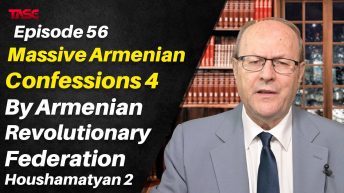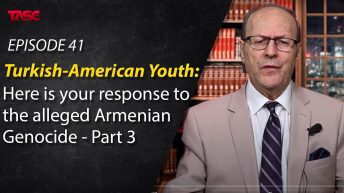n Episode 50, we have seen how Boghos Nubar Pasha, the head of Armenian National Delegation at the Paris Peace Conference, revealed in a 1918 letter to the French government that “…the Armenians have been, since the beginning of the war, ‘de facto belligerents’ as they have fought alongside the Allies on all fronts….” No word about the claim of systematic extermination by the Ottomans. Nubar repeated these confessions in a letter to the editor of The Times of London, published on 30 January 1919. He wrote that “…the Armenians have been belligerents de facto since they indignantly refused to side with Turkey….” He said the Armenians’ faithfulness to the Allies ended up causing the Armenians “dreadful losses.” Again, no word about the claim of systematic extermination by the Ottomans. In Palestine and Syria, Nubar said, where the Armenian volunteers played a significant role in the victory of General Allenby. And in the Caucasus, 150,000 Armenians in the Imperial Russian Army and more than 50,000 Ottoman Armenian volunteers contributed to the Ottoman Empire’s loss of a significant portion of Eastern Anatolia. While Nubar was revealing these facts, he was striving for a place at the Paris Peace Conference table. Little did he know that they would amount to a massive Armenian confession. The Armenian suffering was not due to a systematic extermination campaign by the Ottoman government, as deceptively claimed, but due to the treasonable acts of most Ottoman-Armenians as in siding with the invading enemy armies. These two Nubar letters sum up why the Ottomans, who were fighting for their survival on five fronts while also combatting a widespread Armenian insurgency at home, had to move out of the war zones the Armenian rebels and their logistic base so that the latter could not resupply and assist the rebels. A wartime military measure was taken to mitigate a wartime military threat, purely in defense of the Turkish homeland. There are many more cases of mass relocation in counterinsurgency warfare. To select the Ottoman relocation of Armenian insurgents out of the lot, as if with tweezers, distort the facts surrounding it, and attach the false charge of systematic extermination to it, when Armenian leaders themselves confess publicly that the Armenians were de facto belligerents, can only be explained by Western prejudice towards Turks and Islam, orientalism, and incessant Armenian political pressure and demands. In Episode 51, I have explored with you, another massive Armenian confession, that of the first prime minister of Armenia, Hovhannes Katchaznouni, in the “The Armenian Revolutionary Federation Has Nothing To Do Any More, The Manifesto of Hovannes Katchznouni,” translated by Matthew A. Callender, edited by John Roy Carlson, and published in 1955 by the Armenian Information Service in New York. There Katchznouni relates, “At the beginning of the Fall of 1914 when Turkey had not yet entered the war but had already been making preparations, Armenian revolutionary bands began to be formed in Transcaucasia with great enthusiasm and, especially, with much uproar…The Winter of 1914 and the Spring of 1915 were the periods of greatest enthusiasm and hope for all the Armenians in the Caucasus…We did not doubt that the war would end with the complete victory of the Allies; Turkey would be defeated and dismembered, and its Armenian population would, at last, be liberated.” He points out that Armenians had embraced Russia wholeheartedly, as they believed without justification that Russia would grant Armenians self-government in the Caucasus and the Armenian vilayets liberated from Turkey as a reward for Armenian loyalty and assistance. Katchznouni affirms that Armenians had lost their sense of reality and “… overestimated the ability of the Armenian people, its political and military power, and the extent and importance of the services our people rendered to the Russians. And by overestimating our very modest worth and merit, we naturally exaggerated our hopes and expectations.” Katchznouni’s conclusions are supported by Louise Nalbandian’s book The Armenian Revolutionary Movement, pages 67-89. The Zeitun Rebellion of 1862 was the beginning of massive uprisings. After establishing many secret and violent societies like the Union of Salvation, the Black Cross Society, the Protectors of The Fatherland, the Armenian Party, the Hunchaks, and the Dashnaks, and staging hundreds of bloody uprisings, assassinations, raids, bombings, and finally committing the supreme treason by joining the invading enemy armies, the Armenians compelled the Turks to defend the Turkish homeland against multiple foreign attacks, invasions and equally brutal domestic rebellions.
Myths and Realities




Hope for world peace